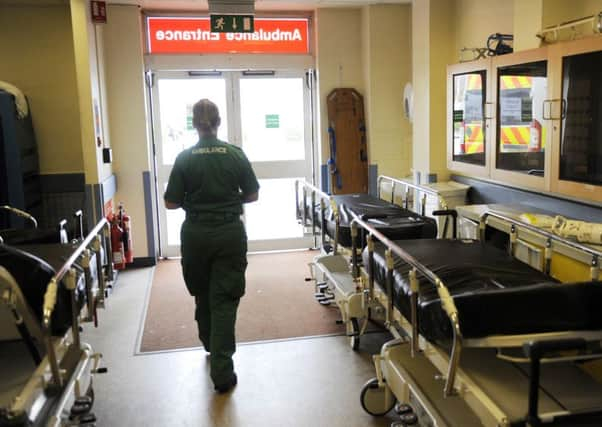Euan McColm: Why voters should take no pride in the NHS


This is quite understandable. Not only is the health service a demonstrably good thing, it also allows us to feel good about ourselves. What type of people are we? We’re the type of people who treat people with compassion, of course.
The NHS in Scotland is not now performing as the SNP assured us it would. The Scottish Government stands accused of breaking a string of promises on waiting times, on staffing levels, on the prompt establishment of trauma centres. I could go on. The NHS in England and Wales is in worse condition still, performing far below the standard promised by the Conservatives.
Advertisement
Hide AdAdvertisement
Hide AdBut it is not just the SNP and the Tories that have struggled to live up to their bold claims when it comes to the health service. The NHS is problematic for all parties. Labour and the Liberal Democrats, when they were in power at both Holyrood and Westminster, were just as culpable of presiding over decline.
In election campaign after election campaign, all mainstream parties have been guilty of making increasingly undeliverable promises. Dutch auctions over waiting times have made it impossible for medical staff to keep up.
In Scotland, the SNP waved the shiny bauble of taxpayer-funded (or “free”, if you prefer to indulge that delusion) prescriptions and we missed the lack of reform taking place in the NHS. We continue to ignore the £50 million annual hole in the drugs budget created by the prescriptions policy.
When the SNP came to power in 2007, one of its first acts was to overturn the decision to close failing Accident and Emergency units at Monklands and Ayr. This policy was dictated by expediency rather than evidence. Medical professionals may have been fully behind the plan to shut down those ailing facilities but campaigning voters knew better. Their grandparents had died in these hospitals and they were going to damn well die in them too.
We voters – all of us potential patients – have a proud track record of being completely unreasonable when it comes to the NHS. We demand the highest standards and we resist change (even when experts say it is necessary) but we have no interest whatsoever in maintaining the NHS by paying more in tax.
Politicians, for their part, have repeatedly promised us unachievable standards at no extra cost to the public purse. We are all – voters and politicians, alike – kidding ourselves if we think we can carry on as we do and see our health service improve.
During First Minister’s Question Time on Thursday, Nicola Sturgeon came under pressure from both the Conservatives’ Ruth Davidson and Scottish Labour leader Kezia Dugdale over the state of the NHS.
Those opposition leaders wanted to know about delays in the establishment of new trauma centres. Sturgeon preferred not to answer questions and instead spent most of her time pointing out that the health service in England is performing more poorly than ours.
Advertisement
Hide AdAdvertisement
Hide AdThis is certainly true, but that is not to say the Scottish NHS is fighting fit. The reality is that the better performance of the Scottish NHS means patients are likely to spend slightly less time abandoned on trolleys in corridors.
We have two choices, then, when it comes to improving the NHS. We can hope that without proper funding the health service will miraculously start to perform better or we can have a long overdue discussion about what we are willing to pay to get the NHS into shape.
Both the SNP and Labour have made the use of private providers in the NHS a taboo. Only a monstrous Tory would countenance such a thing. During the independence referendum campaign in 2014, the SNP argued that only a Yes vote could save the Scottish NHS from privatisation, but the truth is that the nationalists have used – and continue to use – private contractors to maintain parts of the service.
This should not be controversial. If a private contractor can ensure certain standards are met and maintained then should we really allow unworkable “principles” to take precedence and tear up contracts?
In fact, we need to go further and discuss whether there should be charges in other areas. Increased life expectancy is bringing to bear new pressures on an NHS already nearing breaking point. Can we afford not to consider whether the better off might be expected to bear some costs?
A frequent complaint from patients and their families is about the lack of available beds in hospitals. But do all of these patients actually need to be in hospital at all?
The majority of inpatient beds are occupied by people with long-term conditions such as diabetes and arthritis. Most of those afflicted with such permanent conditions administer their own treatment. Couldn’t at least some of them do so at home?
Politicians are so terrified of the potential backlash that they daren’t raise a hand to point out that we simply can’t have the NHS we want if we are not prepared to consider the question of funding.
Advertisement
Hide AdAdvertisement
Hide AdIf we reject the idea that some people should pay something for some treatments and that we should stop giving “free” prescriptions to the rich then how else are we going to fix the health service?
There’s taxes, of course. The Scottish Government could raise tax and plough every last penny into the health service. The only problem with that notion is that, even though we might lie to polling companies from time to time, few of us are truly willing to pay more tax.
Of course, governments are ultimately responsible for the standards of the health services over which they preside. But while voters continue to expect the highest standards without the necessary investment, we all must bear some blame for the appalling state of the NHS.